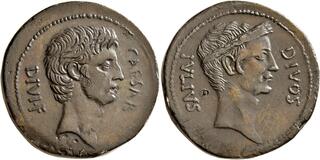This record is provided by CoinArchives, a database of numismatic auction catalogs.
Important copyright information:
The data below is presented by permission of the copyright holder(s). Reproduction is allowed only by authorization from Leu Numismatik AG.
Important copyright information:
The data below is presented by permission of the copyright holder(s). Reproduction is allowed only by authorization from Leu Numismatik AG.
| Leu Numismatik AG > Auction 13 | Auction date: 27 May 2023 |
| Lot number: 233 | |
| Lot description: Octavian and Divus Julius Caesar. Dupondius (?) (Bronze, 31 mm, 22.74 g, 10 h), uncertain mint in southern (?) Italy, circa 38 BC. CAESAR - DIVI•F Bare head of Octavian to right. Rev. DIVOS - IVLIVS Head of Divus Julius Caesar to right, wearing laurel wreath. Babelon (Julia) 99. Crawford 535/1. CRI 308. RBW 1822. RPC I 620. Sydenham 1335. An exceptional example of this prestigious issue, with a very attractive dark brown patina and two superb portraits of splendid fine style. Small punch mark 'D' on the reverse, otherwise, nearly extremely fine. From the Aes Augustorum Collection, formed since the late 1990s. Gaius Octavius was Julius Caesar's grandnephew on his mother's side. He first came to Caesar's attention when he joined him on campaign against the Pompeians in Spain in 46 BC after a daring crossing through hostile territory, although his political opponents implied he had ingratiated himself with his granduncle through other means. Whatever the case, Caesar included Octavius in his will as his primary heir, and when the former was assassinated in 44 BC, the young man officially became his adoptive son, taking the name Gaius Julius Caesar Octavianus. Being Caesar's heir not only provided Octavian (as he is usually called in English) with much political clout, it also earned him a fabulous amount of money. Both were used to their fullest extent in the coming years, as Octavian first dealt with his granduncle's assassins, then with Mark Antony. In 42 BC, moreover, Caesar was officially deified by the Senate. He was regularly featured on Octavian's coins in the years thereafter, such as on this exceptional dupondius. It not only underlined the familial relation between the two men, but also raised an important question: if Octavian was the (adopted) son of a god, what did that make him? Estimate: 5000 CHF |  |


